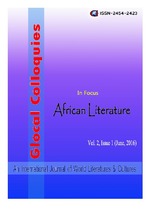| dc.contributor.author | Moolla, Fiona. F | |
| dc.date.accessioned | 2022-01-28T07:28:17Z | |
| dc.date.available | 2022-01-28T07:28:17Z | |
| dc.date.issued | 2016 | |
| dc.identifier.citation | Moolla, F. F. (2016). Dog sacrifice in Isidore Okpewho’s call me by my rightful name and the Works of Wole Soyinka: Ogun, race, identity and diaspora. Global colloquies : an international journal of world literature & cultures, 2(1). | en_US |
| dc.identifier.issn | 2454-2423 | |
| dc.identifier.uri | http://hdl.handle.net/10566/7137 | |
| dc.description.abstract | This essay considers the ways in which the significance of blood
sacrifice in the propitiation of the Yoruba god Ogun is transformed in the
context of international literature which asserts an endogenous African
modernity, and the specificity of black experience and identity. It focuses
mainly on Isidore Okpewho’s 2004 novel, Call Me By My Rightful Name,
compared with the role of Ogun in Wole Soyinka’s aesthetics, foregrounding
key essays, drama and poetry. Okpewho’s novel presents the reality of the
ancestral call among the Yoruba of the American and Caribbean diaspora,
which synecdochically represents the call of an essentialized Africa. The
central character, Otis Hampton, is a middle class basketball playing African-
American college student who inexplicably begins to respond in
uncontrollable ways to African drumming and involuntarily chants in a
language he does not understand. | en_US |
| dc.language.iso | en | en_US |
| dc.publisher | Ranchi: Glocal Colloquies | en_US |
| dc.subject | Dog sacrifice | en_US |
| dc.subject | African diaspora | en_US |
| dc.subject | Yoruba culture | en_US |
| dc.subject | Oral tradition | en_US |
| dc.subject | Race | en_US |
| dc.subject | Nigeria | en_US |
| dc.title | Dog sacrifice in Isidore Okpewho’s call me by my rightful name and the Works of Wole Soyinka: Ogun, race, identity and diaspora | en_US |
| dc.type | Article | en_US |

